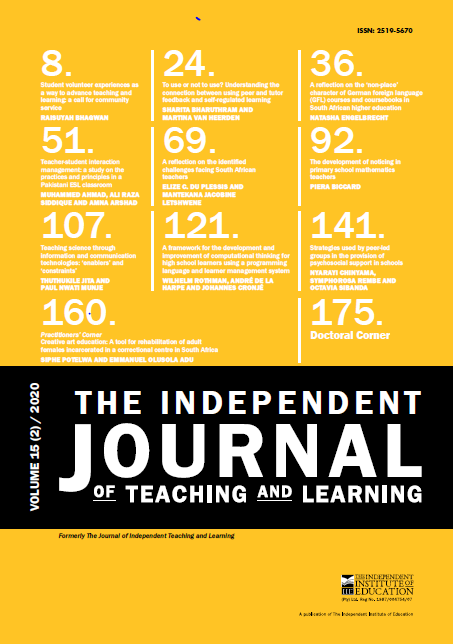To use or not to use? Understanding the connection between using peer and tutor feedback and self-regulated learning
DOI:
https://doi.org/10.17159/ev3ajs24Keywords:
feedback, peer/tutor review, higher education, assessment, self-regulated learningAbstract
Peer and tutor feedback can play a significant role in developing self-regulated learners. It is generally perceived that giving peer feedback is more useful to students. However, the extent to which peer feedback is used is relatively under-researched. This paper examines the use of peer and tutor feedback by undergraduate students. Data were collected qualitatively by means of a student questionnaire. The results show that most students passively and uncritically implemented all the tutor feedback, mostly because they regarded the tutor as the expert. However, the validity of feedback from peers was questioned and challenged, implying that more engagement occurred when implementing peer feedback than tutor feedback. The results suggest that although using tutor feedback may have resulted in better quality essays, using peer feedback led to more critical engagement with the feedback and in so doing enabled greater self-regulated learning.
References
Ashenafi, M.M. (2015) Peer assessment in higher education – twenty-first century practices, challenges and the way forward. Assessment and Evaluation in Higher Education 42(2) pp.226-251.
Boud, D. & Molloy, E. (2013) Rethinking models of feedback for learning: the challenge of design. Assessment and Evaluation in Higher Education 38(6) pp.698-712.
Butler, D.L. & Winne, P.H. (1995) Feedback and self-regulated learning: A theoretical synthesis Review of Educational Research 65(3) pp.245-281.
Denzin, N.K. & Lincoln, Y.S. (1998) Introduction: entering the field of qualitative research. In N.K. Denzin & Y.S. Lincoln (Eds.) The landscape of qualitative research: theories and issues. Thousand Oaks, CA: Sage, pp.1-34.
Gao, Y., Schunn, C.D.D. & Yu, Q. (2019) The alignment of written peer feedback with draft problems and its impact on revision in peer assessment. Assessment and Evaluation in Higher Education 44(2) pp.294-303. Gielen, S., Peeters, E., Dochy, F., Onghena, P. & Struyven, K. (2010) Improving the effectiveness of peer feedback for learning. Learning and Instruction 20(4) pp.304-315.
Hamer, J., Purchase, H., Luxton-Reilly, A. & Denny, P. (2015) A comparison of peer and tutor feedback Assessment and Evaluation in Higher Education 40(1) pp.151-164.
Harland, T., Wald, N. & Randhawa, H. (2017) Student peer review: Enhancing formative feedback with a rebuttal Assessment and Evaluation in Higher Education 42(5) pp.801-811.
Ion, G., Barrera-Corominas, A. & Tomàs-Folch, M. (2016) Written peer-feedback to enhance students’ current and future learning International Journal of Educational Technology in Higher Education 13 pp.1-11.
Lea, M. & Street, B. (2006) The “Academic Literacies” Model: Theory and applications Theory into Practice 45(4) pp.368-377.
Li, L. (2016) The role of anonymity in peer assessment. Assessment and Evaluation in Higher Education 44 (4) pp.1-12. http://dx.doi.org/10.1080/02602938.1174766
Li, L., Liu, X. & Steckelberg, A.L. (2010) Assessor or assessee: How student learning improves by giving and receiving peer feedback. British Journal of Educational Technology 41(3) pp.525-536.
Liu, N. & Carless, D. (2006) Peer feedback: the learning element of peer assessment. Teaching in Higher Education 11(3) pp.279-290.
Lundstorm, K. & Baker, W. (2009) To give is better than to receive: The benefits of peer review to the reviewer’s own writing. Journal of Second language Writing 18(1) pp.30-43. Nicol, D.J. & Macfarlane-Dick, D. (2006) Formative assessment and self-regulated learning: A model and seven principles of good feedback practice. Studies in Higher Education 31(2) pp.199-218.
Nicol, D., Thomson, A. & Breslin, C. (2014) Rethinking feedback practices in higher education: a peer review perspective. Assessment and Evaluation in Higher Education 39(1) pp.102-122.
Patton, C. (2012) “Some kind of weird, evil experiment”: student perceptions of peer assessment. Assessment and Evaluation in Higher education 37(6) pp.719-731.
Quinn, L. (1999) An examination of the drafting-responding process used to develop students’ writing in an English Language for Academic Purposes Course. Unpublished master’s thesis. Rhodes University, South Africa.
Vanderhoven, E., Raes, A., Schellens, T. & Montrieux, H. (2012) Face-to-face assessment in secondary education: does anonymity matter? Procedia Social and Behavioural Sciences 69 pp.1340-1347. https://doi:10.1016/j.sbspro.2012.12.071.
Vardi, I. (2012) The impact of iterative writing and feedback on the characteristics of tertiary students’ written texts Teaching in higher education 17(2) pp.167-179.
Vickerman, P. (2009) Student perspectives on formative peer assessment: an attempt to deepen learning? Assessment and Evaluation in Higher Education 34(2) pp.221-230. Vygotsky, L.S. (1978) Mind in society: The development of higher psychological processes. Cambridge, MA: Harvard University Press.
Walker, M. (2015) The quality of written peer feedback on undergraduates’ draft answers to an assignment and the use made of the feedback. Assessment and Evaluation in Higher Education 40(2) pp.232-247.
Yang, M., Badger, R. & Yu, Z. (2006) A comparative study of peer and teacher feedback in a Chinese EFL writing class. Journal of Second Language Writing 15(3) pp.179-200.
Zhao, H. (2010) ‘Investigating learners’ use and understanding of peer and teacher feedback on writing: A comparative study in a Chinese English Writing classroom’ Assessing Writing 15 pp.3-17.
Downloads
Published
Issue
Section
License
Copyright (c) 2020 The Independent Journal of Teaching and Learning

This work is licensed under a Creative Commons Attribution 4.0 International License.






.png)